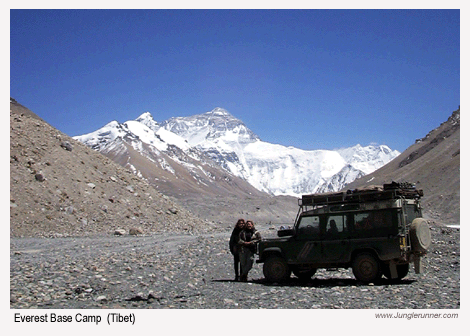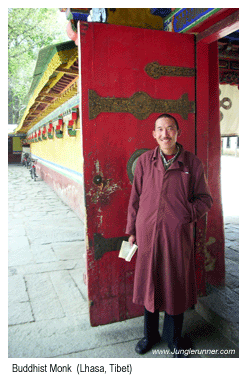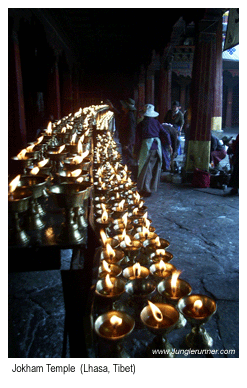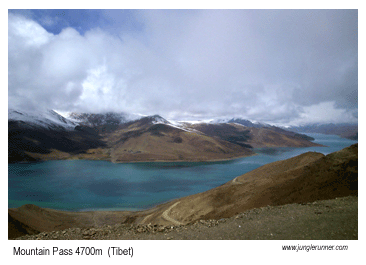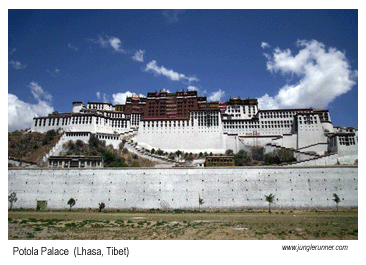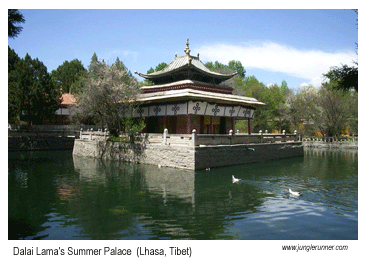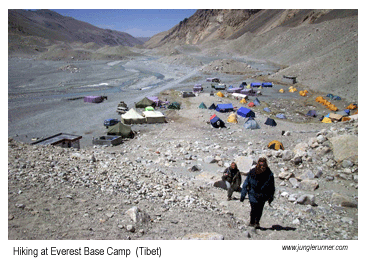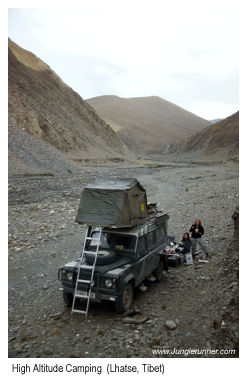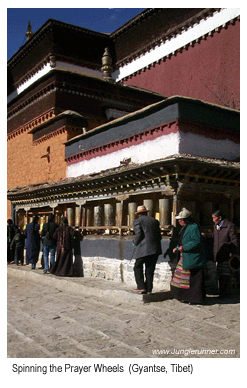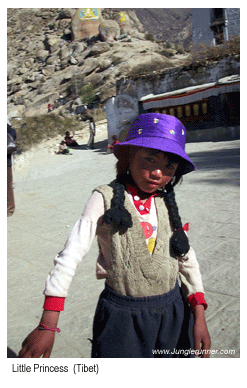
. . . LAND ROVER OVERLAND EXPEDITION
|
#40 - Tibet (Zhangu, TIBET) � I got into some whopping arguments in Tibet, with Sally and Kathryn and a cool couple we met with their own Land Rover Defender who are also driving around the world. My views on Tibet seem to have become quite controversial. As with most countries I went in with my share of biases and sketchy background information and as with most countries the reality was somewhat different than my previous perception. Most of the arguments, or should I say heated discussions, centred on the Chinese occupation of Tibet - whether it was a good thing or bad thing. Virtually any westerner would condemn it without even thinking, but to my surprise after spending time in the country and doing some research I found myself defending it. How could any informed person agree with the armed occupation of country by another? One evening after a great meal at Dunya Restaurant (the finest in Lhasa) I got locked into a fierce debate and tried to explain...
-China is a foreign country that invaded Tibet and rules it, how can you begin to defend that? Well China does have a pretty solid historical claim to Tibet, more so for example than Americans do with the native Indians. In the 18th century after many centuries of back and forth battles alternately favouring Tibet and then China, all of the country came under Chinese control. Tibet remained a vassal state for almost two centuries though it became more and more autonomous as the Chinese government weakened. With the fall of the Qing Dynasty in 1911 Tibet reasserted independence and ejected Chinese officials, though China refused to abandon its claim to all of Tibet. In October of 1950 the Communist government moved across Tibet's eastern border and in 1951 Tibet capitulated, signing a treaty that gave the Dalai Lama power in domestic affairs but ceded control of foreign and military affairs to the Chinese government. Basically Tibet was part of China for over two hundred years, was nominally independent for about forty, and then came back under Chinese control without a war - it was ceded in a treaty. -Yes but China killed monks and burned monasteries! I can't defend that, I can only try to explain it. There are two answers to this. First of all, the Chinese government did it's share of oppression and purging not only in Tibet but in the Western provinces and in the heartland of China itself. Tibet was not the only victim of a misguided regime. Secondly, most of the Tibetan crackdown was in response to internal rebellion. What is not so well known is that the CIA supported internal rebellion in Tibet as part of an overall program to undermine communist regimes in any way possible, starting in 1954 until it flared into a full scale revolt in Lhasa in 1959. The Chinese response to the revolt was brutal, though most in mainland China viewed it as a response to outside sponsored terrorism against the legal government. The reasons for the destruction of so many religious monasteries is that Tibet had an unusual political system. In the 15th century the head of the Gelugpa sect of Tibetan Buddhism allied with Mongol mercenaries (Genghis Khan conquered Tibet in 1206 and Mongol control remained strong until the 15th century) to overthrow the monarchy and combine spiritual authority with political control. By the mid 1900's almost one third of all men in Tibet were monks following the only path available to any power or riches - through the politics of monasteries. To subdue the political unrest China targeted it's source and the majority of monks were driven out of the monasteries or killed. The legacy of this unrest was several decades of heavy military presence and heavy handed security, though in 1980 China admitted Tibet had been 'misgoverned' and began a very slow process of reforms punctuated by occasional violent protests when the pace of change was too slow. -Fine you can explain it but you don't defend it. Why then do you say that Chinese occupation is a good thing? Because since the late '80s the Chinese government has decided to use the 'carrot' instead of the 'stick'. They have built hospitals and improved mortality rates and average longevity, built schools and increased literacy, built highways, airports, urban infrastructure, increased trade, and basically improved the lives of Tibetans in general. It's hard to predict how the Dalai Lama would have done if his country would not have been invaded. But he recently admitted publicly that Tibet had been misgoverned under his rule and that things should have been done differently. Consider. As the leader of the Gelugpa sect the Dalai Lama was the single largest landlord in the world, Tibet belonged to him. The farmers grew food for the monks. Herders tended cattle for the monasteries. Women had no options in Tibet, it was work from cradle to grave. Men had slightly more, they could subsist on Tibet's barren high altitude plains - or join a monastery. Many did so as young as eight. And in a practice that is coming to light, some of these young boys served as passive sexual partners to older priests (source National Geographic, March 2002). Communism certainly has its flaws, but Tibet's system of government was even more repressive in it's own way. All political, religious, and economic control was centered in a single entity. Isolated by geography and mistrustful of any outside contact, it is difficult to know how much change could have come to Tibet without outside intervention. -But the people were happy! You can't apply your western standards to this country. How do you define happiness? What standards do you use? It's impossible to know how Tibet would have done had it stayed independent but use Nepal as a proxy for comparison - even though Nepal is arguably much better positioned for outside trade and with it's monarchy a relatively more open society. Compare Tibet today with Nepal today:
(source: Encarta Encyclopedia 2002, Statistics Center) Buddhism in Tibet was self perpetuating because misery was expected. Can you say people were happy because they accepted their lot? There were no options. Ultimately isn't the best rule of quality of life the number of options a person has available, the freedom to work the farm or become... an orchestra cellist. By building infrastructure, liberalizing education, and opening up trade with the rest of China, a middle class has emerged in Tibet that doesn't wish to return to the way things were. Ultimately what the Tibetans want are the roads, the new house, heating, the luxuries of the middle class... without a Chinese presence, but they can't have their cake and eat it too. Without China the country would be an economic basket case, no history of education, no savings, no entrepreneurial class, no infrastructure to develop their natural resources, no geographic trading partners, and tourism simply would not generate enough income (leaving aside the fact that most of the money goes into the pockets of the very few). China is investing billions of dollars into roads, the first train line into Lhasa (the largest construction project in history), hospitals, schools, etc. They have wisely decided to integrate Tibet into the rest of China so the people can share in the benefits and hopefully decide that to stay with China is preferable to leaving. The reality is that China is in Tibet to stay and even the Dalai Lama seems reconciled to this. -So you are ok with China being here? On one hand - no. Morally their presence can't be justified. Tibet is a cohesive culture with a different language and wish to be independent. They are in most senses an occupied country. But on the other hand, economically, China is Tibet's only hope. Even the locals agree that life under Chinese rule is much better than it was before. The question is whether self determination is worth throwing away the benefits of a very wealthy parent. In the short term I think Tibet gains much more than it loses. For people escaping from the misery of a subsistence life, luxuries like political self determination aren't worth much. Besides, remember what they had! No political choice, virtually no religious choice, and no economic choice. The people want the Dalai Lama back and the Chinese gone - but that's it. They'd rather not go back to the entire old system. -So what is the end game? I see two scenarios. China is betting that the next generation will be seduced by materialism, enlightened by education, and folded into the mainstream of the economy - and will therefore not care that they are part of China. Alternately there is what I would call the Quebec scenario. A minority culture is given special privileges, protected, the people earn enough money and have enough options to begin thinking about the 'big issues' like self determination and ethnic identity. Things they never had time for when life was consumed with the daily grind of survival. And in that situation, economic reasons don't matter and the logic of trade isn't worth a tinker's curse, they will have the education and time to make a serious press for independence. Either way, those scenarios are in the future. Whether it can be morally justified or not, the ugly truth is that China is good for Tibet today and for the next few decades at least. -I don't agree! Then let's agree to disagree.
|
All rights reserved
